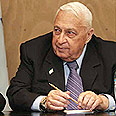
Sharon: Israel will not accept nuclear Iran
Prime minister says Israel is making all necessary preparations to handle with such a situation; warns that nuclear Iran also threat to Arab world and other western countries
“Israel, and other countries cannot accept a situation where Iran has nuclear arms. The issue is clear to us and we are making all the necessary preparations to handle a situation of this kind,” Sharon told journalists in Tel Aviv.
Video: Yaron Brenner
Sharon warned that a nuclear Iran is not only a threat to Israel but also to Arab states and many western countries, but added that Israel is not spearheading international efforts to halt Iran’s nuclear ambitions.
“Israel needs not lead the campaign, yet we are in close contact with countries that are dealing with the issue,” the prime minister said.
Sharon said he agrees with U.S.
President George W. Bush that dealing with Iran’s push for nuclear armament is a top priority.
Sharon added that he hoped the “large danger will be dealt with” by referring Iran to the United Nations Security Council.
“Israel is not hopeless and is taking all the necessary measures,” Sharon said.
The Syrian question
Sharon was showered with a series of questions pertaining to Israel and the region Thursday, marking his first comments since leaving Likud and establishing his new party Kadima.
When asked about Syria, Sharon denied Israel was holding behind-the-scene negotiations with Damascus, describing such moves as
contradictory to the country's strategic interests at a time when President Bashar Assad's regime is under the strain of American and French pressure.
“I don’t believe that today, as the Syrians are under American and French pressure, we need to take actions that will ease the pressure,” Sharon said.
Following the latest flare-up along Israel’s northern border orchestrated by Hizbullah with Syrian and Iranian approval, Sharon sent letters to heads of states in Europe and North America, demanding the international community ensures U.N. Security Council resolution 1559 is fully implemented.
Resolution 1559 calls for the withdrawal of all foreign troops from Lebanon, the disarmament of all militias and the deployment of the Lebanese Army in south Lebanon.
While Syria has withdrawn its troops from Lebanon, Damascus still eyes an influential role in the affairs of its smaller neighbor, Sharon said.
The prime minister added that Syrian and Iranian financial assistance to Hizbullah must stop, and that the Iranian Revolutionary Guards positioned in south Lebanon should be removed.
The Iran Guards are known to have provided training and assistance to Hizbullah guerillas.
'I could not accomplish peace with Likud'
Sharon told the conference that the Palestinians, like the Israelis, need to change their policy towards the conflict, adding that he hoped the Palestinian Authority would be ready to accept the concessions Israel is willing to make.
The PM said that his office is in daily contact with Palestinian Chairman Mahmoud Abbas' headquarters in Gaza.
When asked what separates the Likud and Kadima in reference to the peace process, Sharon replied he did not believe it was possible to accomplish peace with Likud in power.
"The reason why I decided to leave was that I am now looking forward and wish to reach a peace deal. I did not recognize the same wish within Likud, and it seemed to me inappropriate to make such great efforts and struggle for this," he said.
"I therefore reached the conclusion that I
need to take another path in order to achieve a diplomatic resolution," Sharon added.
What about a second disengagement?
When asked whether more territorial concessions will be made under his new political centrist banner of Kadima, Sharon replied “There won’t be a second disengagement.”
The prime minister did not fail to touch on issues pertaining Gaza Strip and West Bank evacuees, noting that he heads a committee discussing plans to resettle evacuated families.
“I estimate that a majority of those living in hotels have already received permanent housing and I believe the rest will be moving in the near future,” he said, adding that the disengagement was a costly move for the state, which opted to extend the disengagement budget to ensure evacuated communities continue to live together.










